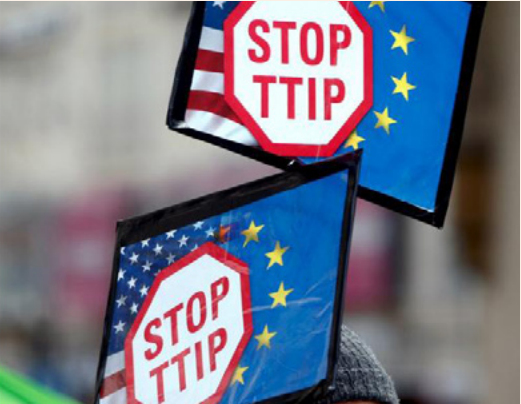
Two FTAs are currently on the table: the Transatlantic Free Trade and Investment (TTIP) between the European Union and the United States and the Comprehensive Economic and Trade Agreement (CETA) between the EU and Canada. The CETA is signed but not yet ratified, and the agreement with the United States being negotiated. If these agreements are applied, they shall constitute a cataclysm for our societies.
As the free trade agreements that they are, treaties aim to attain the highest level of liberalisation of international trade, which is a general liberalisation of economic activities. With them, all economic operators will compete, whatever their activities, suppliers or utilities, and beyond the social consequences that such a thing could trigger.
Both agreements aim to ensure that the internal rules, that is to say, public decisions taken by States, the regions and municipalities, are not an obstacle to trade. And, so they are not, two mechanisms are established. The mechanism for resolving disputes between investors and State (Investor-State Dispute Settlement (ISDS), and regulatory convergence. The dispute mechanism allows a company to denounce public regulation of any level that have a negative impact on its expected economic benefits. This complaint will go to an international body of private arbitration. The arbitration board is presented as a court but it is not. It is composed of lawyers who belong to the largest companies in the sector and as such, lawyers are sold to the highest bidder: a day working for a company, the next for another. They do not feel bound by conflict of interest and it is they who set the compensation to be paid by the States if a public decision goes against.. the earnings of multinationals.
At the mercy of the stakeholders
The regulatory convergence mechanism provides for the creation of a committee of expert civil servants on both sides of the Atlantic that would ask businesses their views on the proposals affecting trade made by a State. Thus, companies decide, before any public debate starts, if the rules go ahead or not. For example, if in the future the European Commission decides to finally regulate the presence of endocrine disruptors in plastics, it would be through the Regulatory Cooperation Committee, to ask the opinion of the companies on the other side of the Atlantic producing endocrine disruptors.
Furthermore, in order to be accepted by the Regulatory Cooperation Committee, future regulations are based formally on scientific knowledge recognized by both sides of the Atlantic. But, for example, we know that genetic, as well as shale gas (fracking) is not unanimously recognized as harmful, especially by industry scientists mercenaries.
Politicians say that treaties are to increase wealth. It is an ancient belief: the benefits of the investments will now be a job tomorrow and after tomorrow. But things have not work that well for at least 30 years now, since as we see there may be profits and unemployment simultaneously. There are examples in all countries.
The second reason, which in my view is the most important, is the action exerted by lobbyists driven, of course, by private interests. Some are very strong and they have been asking for this treaty for years, such as the Trans-Atlantic Business Council (TABC), which represents big business services across the Atlantic; the Chamber of Commerce of the US and EU; international chambers of commerce, European Services Forum (ESF), a lobby of 80 companies in the services sector in Europe, Business Europe, employers' organization representing 40 organisations from 34 countries (including the CEOE), etc. That is the main reason why the European Union listens to corporate lobbyists, as in Canada and the United States. In the institutions of the EU and in the Member States, elected politicians, administrators and business leaders are the same.







